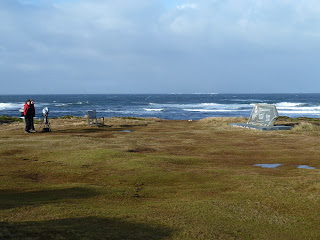[An intermittent and personal report on life in the Falkland Islands...... This week, a stroll in the country, Liberation Day, and a booming economy.......]
 |
| Turkey vultures in town |
It's now midwinter in the Southern Hemisphere. It's snowing today, but the good news is that the days will start to get longer. The horses have been moved to their winter grazing grounds on Stanley Common, and the vultures are moving into town, as food gets scarcer.
 |
| Snow Ghost and friends |
Stanley Common is a large open area, near the local airport, and horse-owners can graze their horses there during the winter for a nominal sum. However, it seems that some oil drums (with oil still in them), have been dumped near the common, and this has leaked. Investigations and clean-ups are still ongoing, but it shows that managing waste on an island, even one with as much space as this one, can be problematical.
 |
| View across Stanley harbour. A new port site? |
If "ordinary" waste such as plastic bags and sewage are not handled well now, then there could be issues when the oil industry arrives in force with more complex challenges. However, I suspect the oil industry is used to working in strictly controlled environments. In fact, I know that otters are thriving around oil installations on Shetland, in the north of Scotland.
 |
| Housing boom/ |
Signs of a booming economy are beginning to appear in the town of Stanley. Houses seem to be popping up in every available spot. "Infilling" the traditional, large gardens is a solution for the lack of space in the centre of town. However, it is not to everyone's liking, and there is much talk about preserving the Falklands' way of life, as inevitable changes appear on the horizon.
Another sign of a healthy economy - a recent Government budget announced a 5% pay rise for all Government employees! And in a recent Penguin News, there were 2 pages advertising various vacancies -
Trainers (for Carpentry, Languages, IT, Hospitality),
Handymen
Legislative Drafter
Regulator
Waitresses/bar staff
Electricians
Storemen
Cleaners
Operations Managers
Nursery Nurses....
~~~~~~~~~~~~~~~~~~~~~~~~~~~~~~~~~~~~~~~~~~~~~~~~~~~~~~~~~~
 |
| Featureless grasslands need good navigation skills..... |
As an antidote to the town, I often try to join walkers in exploring less-visited parts of East Falklands. These walks are often on some of the huge farms, and prior permission is always sought from the landowner. One farm I recently visited was 45,000 acres, which turned out to be much the same size as Liechtenstein, or bigger than the Channel Island of Jersey!.
 |
| White grass underfoot |
So, it usually helps to go with someone with local knowledge or a good map and a GPS! Much of the landscape can appear featureless, so navigation is often an issue. However, on this walk we were largely following a river valley. The main problem was the uneven white grass underfoot. It's impossible to relax and look around, without risking putting your foot in a hole, or stepping on an ankle-turning tussock.
 |
| Cloud cover on the high hills. |
Even so, some of us diverted to a ridge with panoramic views, while others stayed on the riverbanks
Whichever route was chosen, it was hard going. At the end, my pedometer showed 5 miles, while it felt more like 15! There are no paths to follow, and often it seems as if no-one has ever walked there before.
 |
| Nearing the finish..... |
However, despite the effort, it was an enjoyable couple of hours, culminating in great sightings of the Variable Hawk. Several of these beautiful birds were soaring above a cliff on the opposite side of the river.
A Grand Day Out!
~~~~~~~~~~~~~~~~~~~~~~~~~~~~~~~~~~~~~~~~~~~~~~~~~~~~~~~~
 |
| "Eyes.........right" |
On June 14th, a large crowd gathered at the Liberation monument in Stanley, to commemorate those men who gave their lives in liberating the Falklands 31 years ago. Unlike the same day last year, the weather was benign, and despite the sombre aspects of the service, the sunshine lifted the spirits of the spectators.
 |
| A full set...... |
After the service and march-past by troops of the British Army, Navy, and Air Force, and the Falklands Islands Defence Force, everyone (yes, everyone!) was invited to a reception in the Town Hall. This enabled locals and visitors to mingle with the troops, past and present, and chat about their experiences over a beer and some nibbles.
 |
| Mt William |
Afterwards, it seemed a shame to be indoors on such a fine day, and a Public Holiday. So, my wife and I drove a few miles out of Stanley and explored a hill called Mount Harriet, where there are still a number of graphic reminders of the battle that was fought there.
 |
| An old Argentine machine-gun position, looking towards Mt Tumbledown. |
Few of the British troops that liberated the Falklands would have enjoyed this view, as all the fighting was at night, and they were under severe shelling from Argentine guns during the day. However, because of their actions and sacrifices, we, and others, can enjoy it now....
Peter















































